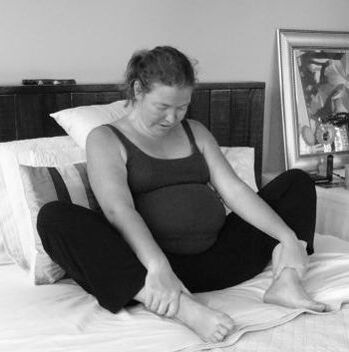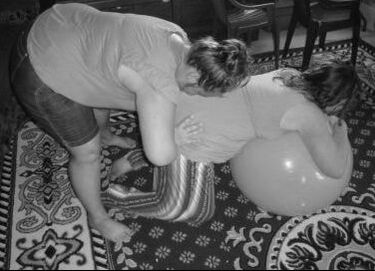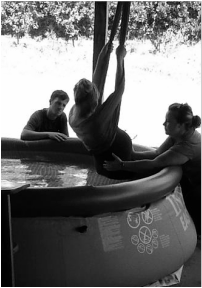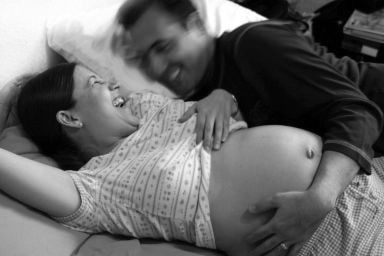|
|
Dealing with pain in labor
Okay, so I am not going to be one of those people that pretends that there is no pain in childbirth. The fact is, childbirth is painful. But If you take away the pain, then you take away part of the experience as well. I have talked with several women that had epidurals and many of them felt, sort of, separated from the whole experience. They also didn't feel as much of a connection with their baby right away. A few of those women later had a natural birth and they said it was an amazing and empowering experience, despite the pain and that is was so much better than their first birth experience!
One important thing that we must remember is that pain does not have to mean suffering. Many people assume that they go together. However, In normal labor pain is rarely intolerable or totally overwhelming if you are upright, moving around and have the support and encouragement that you need. Since most every women in history has had pain in childbirth, we can assume that it is normal. Since all other pain in life has a purpose, it is worth asking what the purpose of pain in labor might be. The answer seems to be that it's physiological as well as psychological.
Physiologically, you need to know when you are in labor. You need to know how far along you are, and if your baby is going to be born soon. The different types and levels of pain that you feel at different stages of labor let you know this information.
So we can see that, taking away the pain of childbirth, can greatly diminish it’s quality and significance. The way a person perceives pain can greatly affect your experience, so if you can begin your labor with a positive mind set you will feel less pain.
So let's talk about some comfort measures you can use to get through labor. These are pain management approaches, not pain relief but they can help a lot!
1. Movement- walk, rock, dance, sway, squat, change positions,or bounce on a birthing ball.
2. Water/shower- bath, big tub in the yard, hose, whatever you have.
3. Stay hydrated -and go pee often. Having a full bladder can make contractions more intense.
4. Small comforts- Ice, juice, cool clothes, warm socks, fan...
5. Rest It is recommend to try and rest, especially if labor begins at night or if you are not very well-rested before labor starts.
6. Massage- Someone can give you a massage with relaxing oils or a tennis ball could be used. There are many forms of massage,a doula will know how to do this or your husband can be shown.
1. Movement- walk, rock, dance, sway, squat, change positions,or bounce on a birthing ball.
2. Water/shower- bath, big tub in the yard, hose, whatever you have.
3. Stay hydrated -and go pee often. Having a full bladder can make contractions more intense.
4. Small comforts- Ice, juice, cool clothes, warm socks, fan...
5. Rest It is recommend to try and rest, especially if labor begins at night or if you are not very well-rested before labor starts.
6. Massage- Someone can give you a massage with relaxing oils or a tennis ball could be used. There are many forms of massage,a doula will know how to do this or your husband can be shown.
|
|
|
|
|
|
7. Acupressure- using a narrow comb curled in your fist during a contraction is suppose to help with pain. Many doula's will know different acupressure points to help labor along, so ask your doula about it.
8. All the mind/body techniques- meditation, hypnosis, etc. RELAXATION is just so important in decreasing the pain. Practicing progressive relaxation during pregnancy can help you to stay relaxed during labor and birth.
9.Noise Making- Groaning, low and deep
10. Aromatherapy- Lavender and Jasmine oils are a few that are known to be relaxing. Jasmine can also help to stimulate contractions.
11. Environmental comforts- music, lights, etc. as you desire them to be.
12. An external focus- a picture, a collage, something you've made that has meaning for you, your husbands eyes, a flower.
13. Breathing- breathe deep, breathe slow.
14. Acceptance- be prepared to accept whatever happens. The unexpected will most likely happen, labor will be unique for every mother. Be prepared to be flexible.
15. Concentrate on the thought of healthy pain- This is pain with a purpose, I will be holding my baby soon!
16. Language- It matters for some people more than others. If words effect you, then tell whoever will be with you in labor how you prefer to say things. If you want contractions to be referred to as waves, or surges, then they can do that.
17. Choose the right companions for your birth- It is soooo... important to be completely comfortable with those around you, when you are in labor. You can even change your mind and tell people to go away once you are in labor is that is what you need.
18.Focus on your baby- Your baby is going to be born, this won't last forever. You will never have a bigger reward for hard work in all your life!
19. Heat- Hot water bottle or heating pad, to put on your back or lower stomach during contractions.
20. Singing- For some people singing is soothing. It is also a great way to keep your mouth relaxed. Open, relaxed mouth= Open relaxed cervix.
Having a doula can make a huge difference in your birth experience!
The word ‘doula’ (pronounced ‘doo-la’) is a Greek word meaning ‘woman servant or caregiver’. A doula (or birth attendant) believes in ‘mothering the mother’, enabling a woman to have the most satisfying experience that she can, from pregnancy and into motherhood. Doulas are trained and experienced in childbirth and are often mothers themselves.
Having a doula is one way that can help you to achieve the natural birth that you might want! Even if you are not able to have your baby vaginally, having a doula with you at a Cesarean birth can help you to deal with everything. Numerous studies have shown the benefits of having a doula present during labor. With the support of a doula, women were less likely to have pain relief medications given, less likely to have a c-section, and most women had a more positive childbirth experience. Not only does it leave the mother with a more positive outlook on childbirth but also the fathers. With a doula there, she helps not only supports the mother but also the father, by helping them to understand the process and helping them to be a better support for their wife. Making the birth experience less stressful for the father. Other studies have shown that having a doula as a member of the birth team decreases the overall cesarean rate by 50%, the length of labor by 25%, the use of oxytocin by 40% and requests for an epidural by 60%.
Those are some pretty impressive results, wouldn't you say!
Here are a few things a doula can do for you:
1) A doula will go entirely by your wants and your needs. She will not try to influence you in any direction. Doula support is different for every couple as it is tailor-made to your needs. We just want to make sure you feel supported unconditionally and have the knowledge you need to make informed decisions about your birth.
2) She will meet at least twice before your birth, so that you can get to know each other, and establish a proper connection. She will listen carefully and encourage you to explore how you feel about birth.
3) Your husband matters too! A doula is also here to support him so that he can be the best support to you during your birth.
4) She will be there for you, on the phone or by email at any time, to answer any questions you may have, or if you just feel worried.
5) A doula will make sure that you have all the information you need to choose where to have your baby.
6) A doula will talk with you about and maybe even try some labor support techniques. She might try massage and various labor comfort measures, so that she can learn what you like and don't like.
7) We can discuss and write your birth plan together, again making sure you have all the information you need, to make the right choices for you and your family.
8) We can plan and talk about postnatal subjects like, looking after yourself, feeding your baby, soothing a crying baby, getting baby to sleep etc...
Having a doula is one way that can help you to achieve the natural birth that you might want! Even if you are not able to have your baby vaginally, having a doula with you at a Cesarean birth can help you to deal with everything. Numerous studies have shown the benefits of having a doula present during labor. With the support of a doula, women were less likely to have pain relief medications given, less likely to have a c-section, and most women had a more positive childbirth experience. Not only does it leave the mother with a more positive outlook on childbirth but also the fathers. With a doula there, she helps not only supports the mother but also the father, by helping them to understand the process and helping them to be a better support for their wife. Making the birth experience less stressful for the father. Other studies have shown that having a doula as a member of the birth team decreases the overall cesarean rate by 50%, the length of labor by 25%, the use of oxytocin by 40% and requests for an epidural by 60%.
Those are some pretty impressive results, wouldn't you say!
Here are a few things a doula can do for you:
1) A doula will go entirely by your wants and your needs. She will not try to influence you in any direction. Doula support is different for every couple as it is tailor-made to your needs. We just want to make sure you feel supported unconditionally and have the knowledge you need to make informed decisions about your birth.
2) She will meet at least twice before your birth, so that you can get to know each other, and establish a proper connection. She will listen carefully and encourage you to explore how you feel about birth.
3) Your husband matters too! A doula is also here to support him so that he can be the best support to you during your birth.
4) She will be there for you, on the phone or by email at any time, to answer any questions you may have, or if you just feel worried.
5) A doula will make sure that you have all the information you need to choose where to have your baby.
6) A doula will talk with you about and maybe even try some labor support techniques. She might try massage and various labor comfort measures, so that she can learn what you like and don't like.
7) We can discuss and write your birth plan together, again making sure you have all the information you need, to make the right choices for you and your family.
8) We can plan and talk about postnatal subjects like, looking after yourself, feeding your baby, soothing a crying baby, getting baby to sleep etc...
The long-term advantages of doula support during labor may be even greater for the baby, as demonstrated in two studies that watched changes in mother and baby interaction following doula support. At six weeks there were awesome postpartum behavioral changes: a significantly larger proportion of women that had used doulas were breastfeeding (51% compared with 29%), and these women were significantly less anxious, had lower scores on a test of depression, and had higher levels of self-esteem.
A Doula's role:
Most doulas meet with the parents a month or so before the baby is due. During this time, they develop a relationship where the mother feels free to ask questions, express her fears and concerns, and help the parents to create a birth plan. The doula will be available to the mother for any doubts or questions that may arise. However a doula does not provide medical care. They are well educated and can answer most questions that a mother may have about pregnancy or birth. During Labor and birth the doula will be with the mother all the time. Giving comfort and support through massage, breathing techniques, positioning and comforting words to help the mother stay positive. Plus so much more, a doula will sacrifice her own comfort to make the mother her focal point at all times.
A Doula's role:
Most doulas meet with the parents a month or so before the baby is due. During this time, they develop a relationship where the mother feels free to ask questions, express her fears and concerns, and help the parents to create a birth plan. The doula will be available to the mother for any doubts or questions that may arise. However a doula does not provide medical care. They are well educated and can answer most questions that a mother may have about pregnancy or birth. During Labor and birth the doula will be with the mother all the time. Giving comfort and support through massage, breathing techniques, positioning and comforting words to help the mother stay positive. Plus so much more, a doula will sacrifice her own comfort to make the mother her focal point at all times.
Where will you give birth?
Where you give birth can make a big difference in how you can handle the pain because above all else you need to feel comfortable and safe! Making the decision of where you want to give birth can be a hard one. Everyone is different and you must choose according to what makes you the most comfortable. There is no wrong answer here, wherever you are most comfortable is the best place for you!
Here are some options that most women choose from.....
Home-
Your home obviously could be comfortable for you, having all your own things around you. You could have a midwife with you and you would free to labor and birth as you want to. If you want to be in your shower or have a waterbirth, you can. You can move around as much as you want, anywhere that you want to. You can have as many or as few of your family and friends as you want with you. You can eat when and what you want. One of the big advantages of giving birth at home comes when your baby is born. You get to have your baby on your chest immediately, no one taking your baby off somewhere to go do tests or something. You get that wonderful skin to skin contact the moment baby is born and there is no rush rush to cut the cord as long and you and baby are doing fine.
Having enough support for labor and the postpartum period in a home birth is important. Many women planning a midwife-attended home birth will also hire a doula. Studies show that women who receive direct support from other women during labor have easier, shorter labors with fewer complications and lower rates of intervention. Research has consistently shown that home birth is as safe or safer than hospital birth, for low risk women with a professional midwife present. There is also a documented reduced risk of infection when giving birth at home. However, everyone is different and some woman may feel that this isn't for you.
Birth Center-
Birth centers offer a low-tech, comfortable place for childbirth that's safer than having your baby at home if problems arise. A birth center offers a homelike atmosphere and you have nurses and midwives to help you. A birth center may be able to offer some things that aren’t available at home, such as IV fluids and pain relief medications ( no epidurals). They are still far more private than a hospital and you have a lot more freedom to move around and do things they way you would at home but with the security of being in place that could get you the help you need, should an emergency arise. Many even have a doctor on call for such cases. You also have the freedom of having your family or friends with you if you choose. Birth Centers a very good options for ladies that aren't confident enough to have a home birth but don't want the hospital either. Most birth centers, will give you prenatal care throughout your pregnancy, then you give birth there, and go there for your postpartum checkups after baby is born. They won't take baby away from you after it is born, which allows you to get that much needed skin to skin bonding, right at birth. Many birth centers will offer childbirth education and breastfeeding classes. Birthing centers are usually only about a third of the cost of a hospital and you get to go home sooner than at the hospital. You will want to talk to the midwives and learn the policies of each birthing center before choosing one though, since some having a higher transport rate that others.
Birth centers offer a low-tech, comfortable place for childbirth that's safer than having your baby at home if problems arise. A birth center offers a homelike atmosphere and you have nurses and midwives to help you. A birth center may be able to offer some things that aren’t available at home, such as IV fluids and pain relief medications ( no epidurals). They are still far more private than a hospital and you have a lot more freedom to move around and do things they way you would at home but with the security of being in place that could get you the help you need, should an emergency arise. Many even have a doctor on call for such cases. You also have the freedom of having your family or friends with you if you choose. Birth Centers a very good options for ladies that aren't confident enough to have a home birth but don't want the hospital either. Most birth centers, will give you prenatal care throughout your pregnancy, then you give birth there, and go there for your postpartum checkups after baby is born. They won't take baby away from you after it is born, which allows you to get that much needed skin to skin bonding, right at birth. Many birth centers will offer childbirth education and breastfeeding classes. Birthing centers are usually only about a third of the cost of a hospital and you get to go home sooner than at the hospital. You will want to talk to the midwives and learn the policies of each birthing center before choosing one though, since some having a higher transport rate that others.
Hospital-
A large majority of women today give birth in a hospital. To many women It is just a tradition, something they just do because that is what everyone else they know does, kind of thing. Many women don't even think about looking into other options. True, hospitals have immediate help if something goes “wrong” during birth, but most births do not need medical interventions. Once you start with the interventions they just seem to lead to more and more interventions. I do believe you can have a great natural birth at the hospital, but you have to find a good supportive doctor or CNM! Not all doctors will be willing to work with you and let you be in charge of your own birth experience. This is the main reason that I chose to have home births with my children with my first 2 children. Choosing the right hospital is also very important. Make sure you go over their rules to make sure that none of their policies will interfere with your plan for a natural birth. You definitely want to make sure that the hospital will you allow you to have the freedom to be up moving around! Writing out a birth plan can also help your chances to have a successful natural birth. Go over it with your doctor or midwife ahead of time and take it with you to the hospital to give to the nurses. Talk to the nurses and get to know them a little. You might be surprised that your nurses may really want to help you achieve your goal of natural birth.
It can also help to have a birth advocate or birth partner. It can help you to stick with your decision to have a natural birth if you have someone who can remind you of your reasons for wanting a natural birth, when you are actually in labor. A professional doula can help you stand up for what you want if medical staff seems resistant to your plan. You are also more likely to have a natural birth if you labor at home as long as possible before going to the hospital. Having a doula with you will help make this possible and she will be able to tell you when you should head to the hospital.
A large majority of women today give birth in a hospital. To many women It is just a tradition, something they just do because that is what everyone else they know does, kind of thing. Many women don't even think about looking into other options. True, hospitals have immediate help if something goes “wrong” during birth, but most births do not need medical interventions. Once you start with the interventions they just seem to lead to more and more interventions. I do believe you can have a great natural birth at the hospital, but you have to find a good supportive doctor or CNM! Not all doctors will be willing to work with you and let you be in charge of your own birth experience. This is the main reason that I chose to have home births with my children with my first 2 children. Choosing the right hospital is also very important. Make sure you go over their rules to make sure that none of their policies will interfere with your plan for a natural birth. You definitely want to make sure that the hospital will you allow you to have the freedom to be up moving around! Writing out a birth plan can also help your chances to have a successful natural birth. Go over it with your doctor or midwife ahead of time and take it with you to the hospital to give to the nurses. Talk to the nurses and get to know them a little. You might be surprised that your nurses may really want to help you achieve your goal of natural birth.
It can also help to have a birth advocate or birth partner. It can help you to stick with your decision to have a natural birth if you have someone who can remind you of your reasons for wanting a natural birth, when you are actually in labor. A professional doula can help you stand up for what you want if medical staff seems resistant to your plan. You are also more likely to have a natural birth if you labor at home as long as possible before going to the hospital. Having a doula with you will help make this possible and she will be able to tell you when you should head to the hospital.
DISCLAIMER : Nothing on this site is meant in any way to be medical advice! Any questions or problems you may have, should be discussed with your caregiver! Thanks!
|
|







